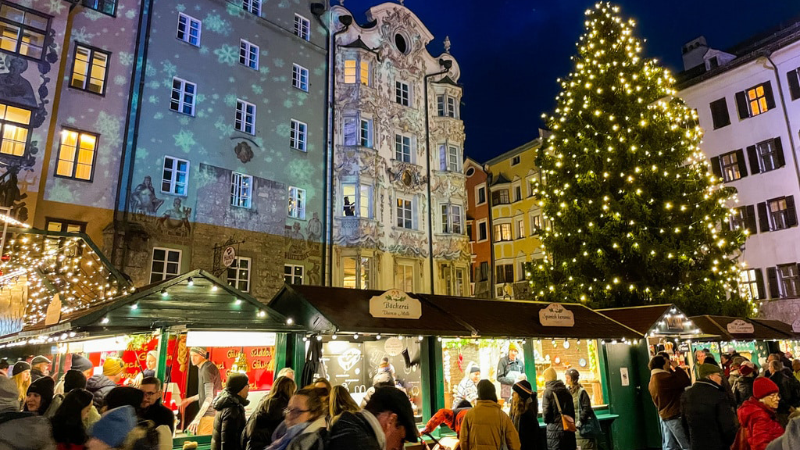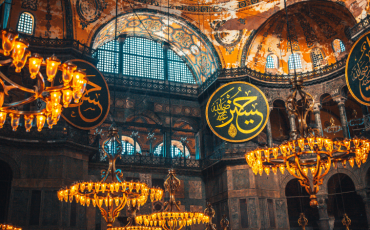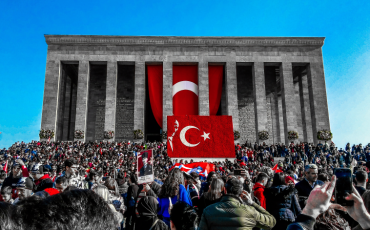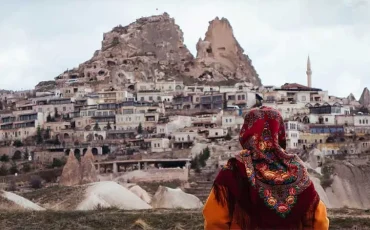What you read in this article:
When we think of Christmas, images of twinkling lights, decorated trees, and festive gatherings often come to mind. But what about in Turkey, a country known for its rich cultural heritage and predominantly Muslim population?
Do Turkish people celebrate Christmas? This question invites us to delve into the heart of Turkish culture, where tradition, religion, and modern influences intertwine in fascinating ways.
Do Turkish People Celebrate Christmas?
Yes, some Turkish people do celebrate Christmas, but it is not a widespread tradition among the predominantly Muslim population. Instead, Christmas is primarily celebrated by the Christian minority, expatriates, and increasingly by urban dwellers influenced by Western culture.
- Religious Diversity: Although predominantly Muslim, Turkey is home to a variety of religious communities, including Christians, Jews, and others, who contribute to its rich cultural mosaic.
- Secular State: Turkey’s constitution defines it as a secular state, ensuring freedom of religion and belief for all its citizens. This secularism creates an environment where various cultural practices, including Christmas celebrations, can coexist.
- Modern Influences: In recent years, Turkey has seen an increase in Western cultural influences, especially in urban areas. This has led to a growing visibility of Christmas decorations and festivities, particularly in cities like Istanbul and Ankara.

Christmas in Turkey
Tracing the origins of Christmas in Turkey reveals a fascinating journey through history. From its early Christian roots in the Byzantine era, through the multicultural Ottoman period, to the secular republic of today, Christmas in Turkey reflects the country’s rich and diverse heritage.
This historical perspective helps us understand the nuanced ways in which Christmas is celebrated and perceived in modern Turkish society. Similarly, other holidays with Christian roots are also celebrated in the country, and you can learn how Turkish people celebrate Easter.
History
Turkey’s history is a complex and colorful tapestry, influenced by a variety of cultures, religions, and civilizations.
Understanding the origins of Christmas in Turkey requires us to journey through time, exploring how this predominantly Muslim country interacts with a holiday deeply rooted in Christianity.
Byzantine Influence
- Early Christian Roots: Before becoming a predominantly Muslim country, Turkey was part of the Byzantine Empire, a significant center of early Christianity. Constantinople (modern-day Istanbul) was the heart of the Christian world, and many of its ancient churches still stand as a testament to this era.
- Church of Hagia Sophia: Once the world’s largest cathedral, the Hagia Sophia is a striking example of Byzantine architecture and its Christian heritage. It was here that many Christmas celebrations would have taken place during the Byzantine era.

Ottoman Empire and Religious Pluralism
- Multicultural Empire: The Ottoman Empire, which ruled over Turkey from the 14th to the early 20th centuries, was a melting pot of various cultures and religions. While Islam was the dominant faith, the empire was home to significant Christian and Jewish communities.
- Milet System: Under the Ottoman rule, the Milet system allowed religious minorities, including Christians, to practice their faith and celebrate religious holidays like Christmas with a degree of autonomy.
Post-Ottoman Era and Secularism
- Secular Foundation: Following the fall of the Ottoman Empire, the Republic of Turkey was established in 1923 by Mustafa Kemal Atatürk. One of Atatürk’s significant reforms was the adoption of a secular constitution, ensuring freedom of religion and promoting a more inclusive society.
- Christian Minorities: Today, Christian minorities, including Greek Orthodox, Armenian, and Syriac Christians, continue to celebrate Christmas. Their traditions and customs add to the rich cultural diversity of Turkey.
Modern Day Celebrations
- Urban Celebrations: In recent years, major cities like Istanbul, Ankara, and Izmir have seen an increase in Christmas festivities. This is largely due to the influence of globalization and Western culture.
- Commercialization: The commercial aspect of Christmas, with its decorations, gift-giving, and festive atmosphere, has found a place in Turkish malls, shops, and public squares, particularly appealing to younger generations and expatriates.

How Turkey’s Dominant Religion Shapes Christmas Observances?
The Islamic influence in Turkey profoundly shapes the observance of Christmas, presenting a unique blend of respect, cultural sensitivity, and modern influences.
While Christmas is not widely celebrated as a religious holiday, it is acknowledged and sometimes enjoyed in a secular, festive manner.
This dynamic illustrates Turkey’s ability to balance its dominant Islamic culture with the diverse practices of its minority communities, contributing to a rich and harmonious cultural tapestry.
Islam in Turkey
Turkey is predominantly a Muslim country, with over 99% of its population identifying as Muslim. The influence of Islam permeates various aspects of Turkish life, culture, and traditions. This influence naturally extends to how Christmas is observed and perceived within the country.
This strong Islamic presence is also evident in the architecture, and many people are curious to learn how many mosques are in Istanbul.
Islamic Perspectives on Christmas
- Respect for Prophets: In Islam, Jesus (known as Isa in Arabic) is regarded as one of the prophets. While Muslims do not celebrate Christmas as the birth of the Son of God, they do respect Jesus as a significant religious figure.
- Different Religious Holidays: Muslims celebrate their own religious holidays, such as Eid al-Fitr and Eid al-Adha. These holidays hold the same significance for Muslims as Christmas does for Christians.

Influence on Christmas Celebrations
- Low-Key Observances: Given that Islam is the dominant religion, Christmas is not a national holiday in Turkey. As a result, the celebrations are more subdued compared to countries where Christianity is the predominant faith.
- Community Celebrations: Christmas celebrations are mainly confined to the Christian minority communities, expatriates, and tourists. These celebrations often take place in churches and private homes rather than in public spaces.
- Cultural Sensitivity: Many Muslims in Turkey may acknowledge Christmas out of respect for their Christian neighbors and friends, but do not partake in the religious aspects of the holiday.
Impact on Public Celebrations
- Urban Influence: In larger cities like Istanbul, Ankara, and Izmir, there is a noticeable increase in Christmas decorations and festivities, influenced by Western culture and the presence of a diverse population. Shopping malls, streets, and some public squares might display Christmas lights and decorations.
- Commercial Aspect: The commercial aspect of Christmas, such as the sale of Christmas decorations, gifts, and festive foods, has found a niche market in Turkey. This commercialization, however, is largely secular and aimed at fostering a festive atmosphere rather than promoting religious observance.
Balancing Tradition and Modernity
- Secular Policies: Turkey’s secular government ensures that all religious communities have the freedom to celebrate their respective holidays. This creates a balanced environment where Christmas can be celebrated by those who observe it without infringing on Islamic traditions.
- Interfaith Harmony: In Turkey, there is a significant emphasis on interfaith dialogue and harmony. This promotes mutual respect and understanding between Muslim and Christian communities, allowing for peaceful co-existence and shared celebrations.

Introduction to the Christian Communities in Turkey
While Turkey is predominantly Muslim, it is home to a diverse range of Christian communities. These include Greek Orthodox, Armenian Apostolic, Syriac Orthodox, Catholic, and Protestant Christians.
Each of these communities has its own unique traditions and practices when it comes to celebrating Christmas. Other holidays are also celebrated in Turkey, and you can read more about how Turkish people celebrate Thanksgiving.
Greek Orthodox Christians
Christmas Eve Liturgy: For Greek Orthodox Christians in Turkey, the celebration of Christmas begins with a special liturgy on Christmas Eve. This midnight service is a time for prayer, hymns, and reflection on the birth of Jesus Christ.
Feasting and Family Gatherings: After the service, families gather to share a festive meal. Traditional foods such as lamb, stuffed grape leaves, and baklava are commonly enjoyed.
Armenian Apostolic Christians
Celebrating on January 6th: Unlike many other Christian communities, Armenian Apostolic Christians celebrate Christmas on January 6th, which is also the Feast of the Epiphany. This dual celebration commemorates both the birth and baptism of Jesus Christ.
Church Services: The day starts with a church service, where the faithful participate in prayers, hymns, and a sermon. The services are often followed by a communal meal and family gatherings.

Syriac Orthodox Christians
Nativity Fast: In the lead-up to Christmas, Syriac Orthodox Christians observe a period of fasting known as the Nativity Fast. This is a time for spiritual reflection and preparation.
Christmas Services: Christmas celebrations include a midnight Mass on Christmas Eve and a morning service on Christmas Day. These services are rich with ancient hymns and liturgical chants.
Catholic and Protestant Christians
Western Traditions: Catholic and Protestant Christians in Turkey often follow Western traditions when it comes to celebrating Christmas. This includes attending Christmas Eve or Christmas Day services, decorating Christmas trees, and exchanging gifts.
Community Events: These communities may also host various events such as Christmas concerts, charity drives, and nativity plays, which are open to the broader public and foster a sense of community and goodwill.
Cultural Practices and Traditions
Christmas Markets: In cities with significant Christian populations, such as Istanbul and Izmir, Christmas markets may be set up. These markets sell festive foods, decorations, and gifts, creating a lively and joyful atmosphere.
Interfaith Participation: It is not uncommon for Turkish Muslims to join their Christian friends and neighbors in celebrating Christmas. This interfaith participation is a testament to the spirit of tolerance and mutual respect that characterizes Turkish society.

Secular and Cultural Christmas
In Turkey, the celebration of Christmas is not limited to religious observance by the Christian minority. The influence of globalization and the country’s secular framework has paved the way for various secular and cultural practices associated with Christmas.
These practices contribute to the festive atmosphere and are embraced by a broader segment of Turkish society.
Commercialization of Christmas
- Festive Decorations: In major cities like Istanbul, Ankara, and Izmir, it is common to see shopping malls, streets, and public squares adorned with Christmas lights and decorations. These displays create a festive environment that appeals to people of all backgrounds.
- Christmas Markets: Inspired by European traditions, Christmas markets have started to appear in some Turkish cities. These markets offer a variety of goods, including handcrafted gifts, decorations, and festive foods, making them popular attractions for both locals and tourists.
Influences from Western Culture
- Santa Claus: Known locally as “Noel Baba,” Santa Claus has become a familiar figure in Turkey. His image is often used in advertisements, decorations, and holiday events, bringing a sense of Western holiday cheer.
- New Year’s Celebrations: In Turkey, New Year’s Eve is a significant celebration, and many of the customs associated with Christmas in the West, such as gift-giving, feasting, and decorating, are integrated into New Year’s festivities. This blending of traditions creates a unique cultural experience.

Family and Social Gatherings
- Festive Meals: Even among those who do not celebrate Christmas for religious reasons, the holiday season is often a time for family and friends to gather and share festive meals. Traditional Turkish dishes, as well as Western-inspired Christmas foods, are enjoyed.
- Holiday Events: Various holiday-themed events, such as concerts, plays, and charity drives, are organized during the Christmas season. These events are typically secular and focus on themes of goodwill, generosity, and community spirit.
Influence of Expatriates and Tourism
- Expatriate Communities: Turkey is home to a sizable expatriate community, particularly in cities like Istanbul. These communities often celebrate Christmas with traditional customs from their home countries, and their influence can be seen in the broader society.
- Tourism: The influx of tourists during the holiday season has also contributed to the adoption of Christmas practices. Hotels, restaurants, and tourist attractions often create special Christmas-themed offerings to cater to international visitors.
Media and Pop Culture
- Television and Movies: Christmas-themed movies and TV shows have become popular in Turkey, particularly among younger generations. These media portrayals contribute to the wider acceptance and enjoyment of Christmas-related customs.
- Music: Christmas music, including classic carols and modern holiday songs, is often played in public spaces and on the radio, adding to the festive ambiance.

Secular and cultural practices related to Christmas have become an integral part of the diverse tapestry of Turkish society.
From festive decorations and Christmas markets to the influence of Western culture and expatriate communities, these practices transcend religious boundaries and contribute to a broader celebration of the holiday season.
The cultural diversity in Turkey is also evident in its linguistic landscape, and it is a common question whether someone should learn Turkish or Arabic, as they are two major languages in the region.
By embracing these secular traditions, Turkish society showcases its ability to blend different cultural influences while fostering a sense of unity and joy during the festive season.
Regional Customs and Unique Christmas Celebrations
While Christmas is not a national holiday in Turkey, various regions with significant Christian populations or historical influences have developed unique customs and festivities associated with Christmas. These local traditions add to the rich cultural mosaic of the country.
The regional customs and unique Christmas celebrations in Turkey highlight the country’s diverse cultural heritage. From the ecumenical services in Istanbul to the ancient traditions of Hatay and the festive markets of Izmir, each region brings its own flavor to the holiday season.
These local festivities not only preserve historical traditions but also adapt to modern influences, creating a dynamic and enriching experience for all who partake.

Istanbul: A Melting Pot of Traditions
- Ecumenical Services: Istanbul, home to the Ecumenical Patriarchate of Constantinople, holds significant religious services during Christmas. The St. George’s Cathedral in the Fener district becomes a focal point for Orthodox Christians, where the patriarch leads the midnight Mass.
- Christmas Markets: The city’s diverse population and tourist influx have led to vibrant Christmas markets, especially in neighborhoods like Kadıköy and Beyoğlu. These markets feature handmade crafts, festive foods, and live music, creating a lively holiday atmosphere.
Hatay: A Historical Confluence
- Orthodox Celebrations: Hatay, an ancient city with deep Christian roots, sees Orthodox communities celebrate Christmas with traditional liturgies and family gatherings. The Church of St. Peter, one of the oldest in the world, holds special significance during this time.
- Cultural Festivities: Hatay is known for its multicultural harmony. During Christmas, you might find a blend of Arabic and Turkish influences in the festivities, including traditional music, dance, and regional delicacies.
Izmir: Western Influence and Local Charm
- Catholic and Protestant Services: Izmir’s sizable Catholic and Protestant communities host a variety of Christmas services and events. The St. John’s Cathedral and the House of the Virgin Mary near Ephesus are popular pilgrimage sites.
- Public Celebrations: The city center, particularly around Alsancak and the waterfront, is decorated with lights and Christmas trees. Public concerts, charity events, and festive parades are common, reflecting the city’s cosmopolitan nature.

Mardin: A Blend of Cultures
Syriac Orthodox Traditions: In Mardin, the Syriac Orthodox community celebrates Christmas with traditional liturgies conducted in the ancient Aramaic language. The Mor Gabriel Monastery, a key religious site, is central to these celebrations.
Festive Foods: The region’s unique cuisine, influenced by its Assyrian and Kurdish heritage, features prominently during Christmas. Special dishes like “kubbeh” (a type of meatball) and “dobo” (a lamb stew) are prepared for festive feasts.
Cappadocia: Tourism and Tradition
- Cave Churches: The historical cave churches of Cappadocia, such as those in Göreme, hold special services during Christmas. These ancient sites provide a unique and atmospheric setting for worship.
- Tourist Attractions: Cappadocia’s popularity as a tourist destination means that many hotels and restaurants offer Christmas-themed events, including festive dinners, traditional music performances, and hot air balloon rides over the snowy landscape.
Bursa: A Blend of History and Modernity
- Orthodox Heritage: Bursa, with its significant Greek Orthodox history, has churches that celebrate Christmas with traditional liturgies. The city’s ancient churches, like the Church of St. George, become vibrant centers of worship.
- Modern Celebrations: Modern Christmas celebrations in Bursa often include public concerts, Christmas fairs, and special winter sports events at nearby Mount Uludağ, blending historical reverence with contemporary festivity.

Government Policies on Christmas
Turkey’s government, under its secular constitution, provides a framework within which various religious and cultural celebrations, including Christmas, can take place.
While Christmas is not a national holiday, there are policies and initiatives that influence how it is observed by different communities.
Secularism in Turkish Governance
Secular Framework: The Turkish Republic was founded on the principles of secularism, which means that the state remains neutral in matters of religion. This allows for the free practice of all religions, including Christianity, and their associated holidays.
Religious Freedom: Turkey’s constitution guarantees freedom of religion, which extends to the celebration of religious holidays like Christmas. Christian communities are free to conduct their services and celebrations without government interference.
Supporting Religious Minorities
Legal Protections: Religious minorities, including Christians, have legal protections to practice their faith and celebrate their holidays. This includes the right to gather for worship, hold public and private events, and decorate religious sites.
Property Rights: Churches and religious organizations are granted property rights, allowing them to maintain and operate their places of worship, where Christmas services and celebrations are held.

Cultural Initiatives and Public Awareness
Cultural Festivals: The government occasionally supports cultural festivals that showcase Turkey’s religious diversity. These festivals may include representations of Christmas traditions, fostering a broader understanding and appreciation of different cultural practices.
Education and Interfaith Dialogue: Government-backed educational programs and interfaith dialogue initiatives aim to promote mutual respect and understanding among Turkey’s diverse religious communities.
This helps in creating an inclusive environment where Christmas celebrations can be understood and respected by all.
Tourism and Economic Impact
Tourism Promotion: The government promotes Turkey as a diverse and welcoming destination for tourists, including during the Christmas season. Special efforts are made to highlight festive events and attractions that appeal to international visitors.
Economic Benefits: Recognizing the economic benefits of holiday tourism, the government supports initiatives that enhance the festive atmosphere in key tourist areas.
This includes allowing and encouraging Christmas markets, special events, and festive decorations in public spaces.

Public Spaces and Decorations
Festive Decorations: In major cities like Istanbul and Izmir, local municipalities often allow and even facilitate festive decorations in public spaces. This includes Christmas lights, trees, and markets, which contribute to the holiday spirit and attract both locals and tourists.
Public Events: Various public events, such as concerts and fairs, are permitted during the Christmas season. These events, often secular in nature, enhance the cultural fabric of the holiday season.
Challenges and Criticisms
Balancing Secularism and Religious Expression: One of the challenges the government faces is balancing its secular principles with the promotion of religious expression. Ensuring that all religious groups feel equally respected and represented remains a critical task.
Public Sentiment: While the government provides a framework for religious freedom, public sentiment can vary. Efforts to promote interfaith harmony and understanding are ongoing to ensure that Christmas celebrations are not only protected but also respected by the wider population.
The Turkish government’s stance on Christmas celebrations is shaped by its secular constitution and commitment to religious freedom.
Policies and initiatives that support religious minorities, promote cultural awareness, and enhance tourism all play a role in how Christmas is celebrated in Turkey.
By fostering an inclusive and respectful environment, the government helps ensure that Christmas, along with other religious and cultural holidays, is observed in a manner that enriches Turkey’s diverse society.

Interfaith Harmony
Turkey’s rich cultural and religious tapestry is a testament to the coexistence of diverse communities. During the Christmas season, this coexistence often manifests in unique ways as different religious groups share in each other’s celebrations, fostering mutual respect and understanding.
Mutual Respect and Shared Celebrations
Respectful Observance: In Turkey, religious communities, including Muslims, Christians, Jews, and others, generally show a high level of respect for each other’s religious practices and celebrations.
During Christmas, this respect is evident as non-Christians acknowledge and sometimes participate in the festive spirit.
Community Gatherings: Interfaith gatherings during the holiday season are not uncommon. These events may include community dinners, charity drives, and cultural festivals where people from different religious backgrounds come together to celebrate.
Interfaith Dialogues and Initiatives
Interfaith Dialogues: Various organizations and institutions in Turkey promote interfaith dialogue, especially during significant religious holidays like Christmas. These dialogues aim to build bridges between different communities, emphasizing common values and mutual respect.
Educational Programs: Schools and universities often host events and lectures that highlight the importance of interfaith harmony.
During the Christmas season, such programs may include discussions on the holiday’s cultural and religious significance, encouraging students of all backgrounds to learn and appreciate the diversity around them.

Cultural Blending and Festive Participation
Cultural Events: Many cultural events during the Christmas season are designed to be inclusive, inviting participation from all communities. Concerts, plays, and public festivities often draw diverse crowds, fostering a sense of shared celebration.
Secular Celebrations: In secular settings, such as shopping malls and public squares, Christmas decorations and events are enjoyed by people of all religions.
The festive atmosphere created by lights, music, and markets transcends religious boundaries, bringing joy to everyone.
Family and Social Dynamics
Interfaith Families: In families where members belong to different religions, Christmas can be a time of shared celebration. These families often blend traditions, creating unique holiday experiences that honor both Christmas and other religious practices.
Friendship and Social Networks: Among friends and social networks, it is common for individuals to participate in each other’s religious celebrations.
For example, Muslim friends might join their Christian friends for Christmas dinners, while Christians might attend Iftar dinners during Ramadan.
Religious Tolerance and Legal Framework
Legal Protections: Turkey’s legal framework supports religious freedom and tolerance, ensuring that all communities can celebrate their religious holidays without fear of discrimination. This legal protection extends to the celebration of Christmas by Christian minorities.
Public Support: Local municipalities and public institutions often support interfaith initiatives and events, reinforcing the message of tolerance and coexistence.
During Christmas, this support may be visible in public decorations, community events, and inclusive policies.

Challenges and Opportunities
Overcoming Prejudices: While interfaith harmony is generally strong, there are still challenges in overcoming prejudices and misconceptions. Continuous efforts in education, dialogue, and community engagement are essential to address these challenges.
Enhancing Cooperation: Opportunities for further enhancing interfaith cooperation during the Christmas season include more collaborative events, shared charitable initiatives, and increased visibility of interfaith dialogues in the media.
The coexistence of different religious communities in Turkey during Christmas is a powerful example of interfaith harmony.
Through mutual respect, shared celebrations, and ongoing dialogues, Turkey’s diverse population embraces the holiday season in a manner that reflects its rich cultural heritage.
This harmonious coexistence not only enriches the festive experience but also strengthens the social fabric of Turkish society, promoting peace and understanding across religious boundaries.

Perspectives on Christmas Celebrations from Locals
Exploring local perspectives on Christmas celebrations in Turkey provides a nuanced understanding of how different communities perceive and engage with the holiday season. These insights reflect the diversity and cultural dynamics within Turkish society.
Perspectives from Different Communities
- Christian Communities: Turkish Christians, particularly in areas like Istanbul, Izmir, and Mardin, celebrate Christmas with religious services, family gatherings, and traditional customs. For them, Christmas holds deep religious significance and is a time for spiritual reflection and community solidarity.
- Muslim Majority: Many Muslims in Turkey participate in secular aspects of Christmas, such as festive decorations, gift exchanges, and social gatherings. Christmas is often viewed as a cultural event that promotes unity and goodwill among neighbors and friends.
- Secular Population: Secular Turks may embrace Christmas as a time for enjoyment, festive spirit, and a break from routine. They engage in holiday traditions without religious connotations, focusing on universal themes of generosity and togetherness.
Regional Insights
- Urban vs. Rural Areas: In urban centers like Istanbul and Ankara, Christmas celebrations are more visible due to diverse populations and commercial influences. Public spaces are adorned with decorations, and festive events attract locals and tourists alike. In contrast, rural areas may observe Christmas in a quieter, more traditional manner, emphasizing religious customs and family gatherings.
- Historical and Cultural Significance: Regions with historical ties to Christian communities, such as Hatay and Mardin, may observe Christmas more prominently, preserving local customs and traditions passed down through generations.
Generational Perspectives
- Older Generations: Older Turks often emphasize the religious and cultural aspects of Christmas, maintaining traditional observances and passing down customs to younger family members. They view Christmas as a time to reconnect with heritage and uphold spiritual traditions.
- Younger Generations: Younger Turks, influenced by modern lifestyles and global trends, may reinterpret Christmas celebrations to reflect their own values and interests. They blend traditional practices with contemporary elements, embracing the holiday as a cultural expression of joy and solidarity.
Economic and Social Influences
- Commercialization: The commercial aspect of Christmas influences how it is perceived and celebrated in Turkey. Shopping malls, restaurants, and businesses capitalize on the festive season with special offers and themed events, appealing to consumers of all backgrounds.
- Social Cohesion: Community events, charity drives, and cultural festivals during the Christmas season promote social cohesion and strengthen community bonds. These initiatives encourage interaction among diverse groups and foster a sense of unity.
Community voices provide valuable insights into the diverse perspectives on Christmas celebrations in Turkey. From religious observances to secular festivities, Turks embrace Christmas as a time for unity, cultural expression, and shared joy.
By acknowledging and respecting these varied perspectives, Turkey celebrates the richness of its cultural heritage and promotes mutual understanding among its diverse communities during the holiday season.
International Impact on Turkish Christmas Traditions
The celebration of Christmas in Turkey is not only shaped by local customs and historical influences but also influenced by global trends and international practices.
Understanding these global influences provides insights into the evolution and adaptation of Christmas traditions within Turkish society.
Western Cultural Influence
- Adoption of Western Traditions: Christmas in Turkey has been significantly influenced by Western cultural practices, including the decoration of Christmas trees, hanging of lights, and exchange of gifts. These customs, originally Western, have been embraced and adapted to fit Turkish cultural contexts.
- Santa Claus Iconography: The figure of Santa Claus, known as “Noel Baba” in Turkish, originates from Saint Nicholas, a historical figure from the region of Demre in Antalya. Turkish folklore has integrated Santa Claus into local Christmas traditions, reflecting global recognition and adaptation.
Media and Entertainment
- Global Media Representation: Television, movies, and online platforms play a crucial role in promoting global Christmas traditions in Turkey. International media often portrays Christmas as a universal celebration of joy, family, and goodwill, influencing local perceptions and practices.
- Pop Culture Influence: Turkish entertainment industry incorporates Christmas themes and settings into television shows, movies, and music, catering to a diverse audience and reflecting global cultural exchange.

Economic and Commercial Aspects
- Retail and Consumerism: The commercialization of Christmas, driven by global retail trends, impacts how the holiday is observed in Turkey. Shopping malls, markets, and businesses promote Christmas sales, decorations, and festive products, aligning with international consumer expectations.
- Tourism and Hospitality: Turkey’s tourism sector capitalizes on Christmas as a festive season, attracting international visitors with holiday-themed attractions, events, and hospitality offerings. Tourists contribute to the globalization of Christmas traditions by participating in local celebrations.
Cross-Cultural Exchange
- International Communities: Expatriate communities in Turkey bring their own Christmas traditions and practices from around the world. This diversity enriches local celebrations, fostering cross-cultural exchange and mutual understanding among residents and visitors.
- Educational and Diplomatic Initiatives: Schools, universities, and diplomatic institutions in Turkey may host international Christmas events and cultural exchanges, promoting intercultural dialogue and celebrating diversity.
Environmental and Social Impacts
- Sustainability Practices: Global movements towards sustainability influence Christmas celebrations in Turkey, encouraging eco-friendly practices such as recycling decorations and reducing environmental impact.
- Social Cohesion: Global Christmas traditions emphasize themes of unity, charity, and compassion, encouraging Turks to participate in community service, charity drives, and humanitarian efforts during the holiday season.
The international impact on Turkish Christmas traditions underscores the interconnectedness of cultures in a globalized world.
As Turkey integrates global influences into its local celebrations, the holiday season becomes a reflection of cultural exchange, diversity, and shared humanity.
By embracing global traditions while honoring local customs, Turkey enriches its cultural landscape and celebrates Christmas as a time of joy, unity, and mutual respect among people of all backgrounds.
Conclusion
Christmas in Turkey serves not only as a time for religious reflection and familial gatherings but also as a cultural celebration that fosters unity and mutual respect among diverse communities.
It bridges religious boundaries, promotes interfaith dialogue, and highlights Turkey’s commitment to preserving cultural heritage while embracing global influences.
The Christian minority in Turkey observes Christmas with a variety of rich and meaningful traditions. Each community, from Greek Orthodox to Armenian Apostolic, Syriac Orthodox, Catholic, and Protestant, brings its own unique cultural practices to the celebration of this important holiday.
Despite being a minority, these communities maintain their traditions and contribute to the multicultural tapestry of Turkey. The observance of Christmas among Turkish Christians highlights the country’s religious diversity and the harmonious coexistence of different faiths.
As we conclude our journey through the multifaceted landscape of Christmas in Turkey, we are reminded that traditions evolve, yet their essence remains a testament to the enduring spirit of unity and joy.
By embracing diversity and cherishing cultural heritage, Turkey exemplifies how celebrations like Christmas transcend borders, bringing people together in the shared embrace of goodwill and festive cheer.
FAQ
No, Christmas is not an official public holiday in Turkey.
While Christmas isn’t a widespread religious holiday, many Turks celebrate New Year’s Eve (Yılbaşı) with traditions that are similar to Christmas, such as decorating trees and exchanging gifts.
Turkish Christians celebrate Christmas with religious services and events at churches, particularly in major cities like Istanbul.
Yes, the historical figure St. Nicholas, who inspired the legend of Santa Claus, was born in what is now modern-day Turkey.





Comments